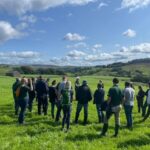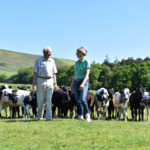The Duchy Farming Family
We hosted an informal meeting of our Lancashire farming tenants in Whitewell at the end of last year as part of our drive to encourage them to learn about the regenerative farming practices adopted by their peers and to share their own ideas and practical experiences. Over 20 tenants attended the evening event which included a presentation from our guest speaker, Angus Dalton, a first-generation farmer who owns 750 acres of grassland at the southern tip of the Peak District.
Having originally followed a very conventional path in dairy farming, Angus moved to more of a grazing system in 2008. In 2012, he established a Once A Day (OAD) herd, milking alongside the current herd. Two years later, after monitoring the impact on his business and collecting first-hand data to support his plans for growth, he made the business fully OAD in 2014. The next step was to move to a purely grass-fed system, which he did in 2018, and the herd now operates a very simple and profitable low input grazing system.
Among the practical tips shared by Angus was the principle of dividing fields into smaller paddocks using temporary electric fencing and small mobile water drinkers. This enables intensive grazing on a very small area for a short period, allowing farmers to graze up to 100,000 tonnes of cattle or 200 cows at 500kg, on a single acre in just one day. He went on to suggest that anyone interested could experiment with young stock and dry cows and was confident that this approach would lead to a discernible improvement in herd health. Angus stated that he was saving circa £100,000 on overwintering feed costs as a result of this changed approach.
As many of our Whitewell tenants are farming in an area that receives circa 120 inches of rain on shallow soil over clay per annum, the presentation prompted a great deal of commentary and challenge. However, when asked about the practicalities of out-wintering in an area with such high rainfall, Angus pointed out that herbal leys, with their established root structures, recover quickly and significantly improve soil drainage.
The consensus was that, while transitioning a farm livestock enterprise to pasture only is not for everyone, the systems highlighted can be trialled without incurring significant cost and may help to build in long-term business resilience.
Commenting on the success of the event, the Duchy’s Head of Rural Investment, Mark Coombs, said: “It is so valuable for our tenants to share their breadth of experience with each other and offer support to those who are trialling more sustainable processes for the first time. We are very keen to facilitate knowledge-sharing across the entire Duchy family and will be hosting similar events across all of our rural estates in the year ahead.”


